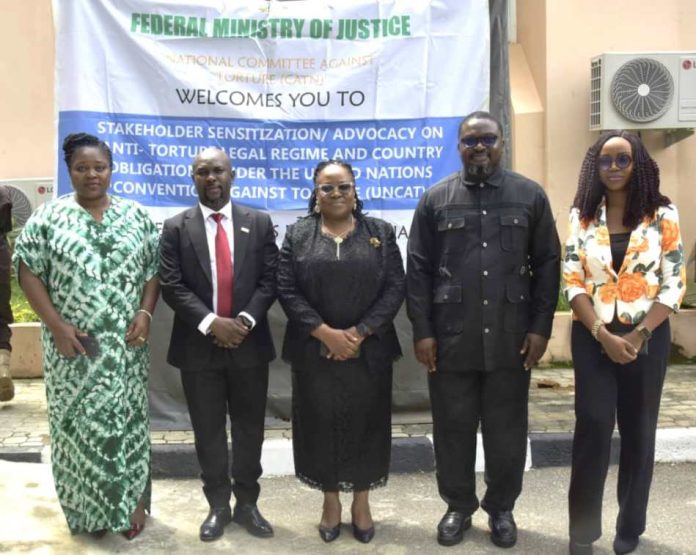The Federal Government has reiterated its unwavering commitment to upholding the rule of law, promoting humane treatment of suspects, and strengthening legal safeguards against torture, cruel, inhuman, or degrading treatment.
This was stated today 24th September,2025 at the Ministry’s Auditorium, Abuja, in a
keynote address by the Solicitor-General of the Federation and Permanent Secretary, Federal Ministry of Justice, Mrs. Beatrice Jedy-Agba, oon, mni, represented by Ms. Roseline Tasha, Director Citizens Rights Department.
The workshop titled: sensitization workshop for law enforcement agencies on the Prohibition of Torture and Nigeria’s obligations under the Optional Protocol to the Convention Against Torture (OPCAT)
The Permanent Secretary noted that the Ministry of Justice will continues to drive reforms to ensure compliance with both domestic laws and international treaties, in line with Nigeria’s ratification of OPCAT in 2009 and the enactment of the Anti-Torture Act of 2017.
Jedy-Agba charged the law enforcement agencies to see the sensitization not as a burden, but as an opportunity to uphold professionalism, reinforce the rule of law, and foster a culture of respect for human rights.
“I commend the Inter-Ministerial Committee against Torture (CATN) for the coordinating efforts across relevant MDAs and agencies, in preventing torture not only to protects vulnerable groups but also to strengthens Nigeria’s international reputation and institutional reputation and institutional credibility.” She said.
Mrs. Ogechi Ogu, the Executive Director/Founder PAR-RVP- INITIATIVE On Rights and Rehabilitation of Vulnerable Persons Initiative, in her presentation during the technical session gave Highlights of the Workshop to include:
-Constitutional and Legal Safeguards
- Section 34(1)(a) of the 1999 Constitution guarantees the dignity of every individual and prohibits torture.
- Section 8(1) of the Administration of Criminal Justice Act (ACJA) 2015 prohibits torture or degrading treatment of suspects.
- Section 14(2) ACJA mandates custodial authorities to provide facilities for legal advice, bail, and defense.
- Pre-Trial Safeguards
.Section 35(4) of the Constitution requires that arrested persons be brought before a court within a reasonable time. - Suspects must be promptly informed of their rights, including access to legal representation and notification of next of kin at no cost.
- Why Safeguards Matter
- Torture often leads to false confessions and wrongful convictions, undermining justice and public trust.
- Upholding rights strengthens fairness, accountability, and confidence in law enforcement.
- International Standards
- Nigeria, as a signatory to the UN Convention Against Torture and OPCAT, is bound by international obligations.
- Global instruments such as the UN Nelson Mandela Rules, the ICCPR, and the Basic Principles on the Use of Force provide standards for humane treatment of detainees.
- Regional frameworks such as the African Commission’s Robben Island Guidelines further strengthen safeguards.
- Oversight and Monitoring
- The National Preventive Mechanism (NPM), under the National Human Rights Commission, inspects detention facilities to prevent abuse.
- Cooperation with monitoring bodies, including the UN Subcommittee on Prevention of Torture (SPT) and Civil Society Organizations, remains critical.
In attendance are representatives of Prison, Police, National Agency for Prohibition of Trafficking in persons (NAPTIP), Nigerian Immigration, Civil Defense Corps, and Human Rights Commission.
Signed
Hauwa Bala
Head, Information & PR
24th September, 2025






